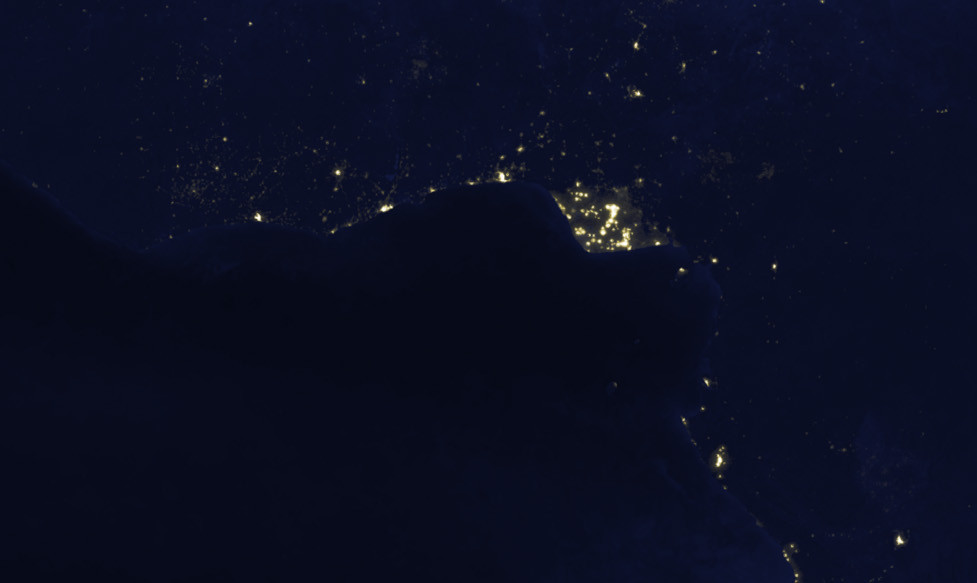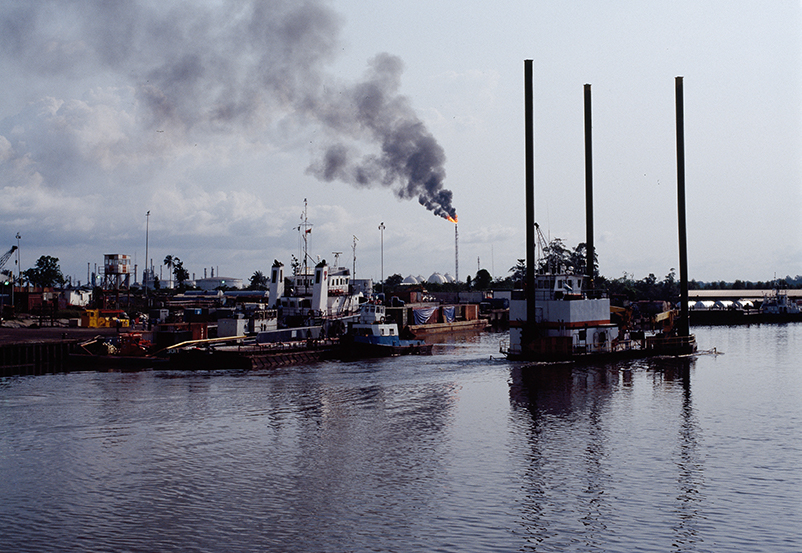- About
- Topics
- Picks
- Audio
- Story
- In-Depth
- Opinion
- News
- Donate
-
Signup for our newsletterOur Editors' Best Picks.Send
Read, Debate: Engage.
The capital of oil-rich Rivers state in the Niger Delta is home to roughly 1 million people and the bustling city is fondly called the Garden City. However, in recent time particulate soot from gas flaring has been polluting the city. What are the long-term health and environmental implications of the reckless flaring in major population centres in the country? Will Nigeria be able to meet the set target of ending gas flaring by 2020?
In autumn of 2016, I visited Port Harcourt, again, having once lived briefly during the early years of the millennium. The ‘Garden City’ as the oil-rich metropolis is popularly called, Port Harcourt was named the capital of Rivers State after the end of the Nigerian civil war, as the military sought to combat forces of secession. I was in Port Harcourt on an assignment, covering into the proposed Economic Partnership Agreement (EPA) between the European Union and the Economic Community of West African States (ECOWAS). Headquartered in the Nigerian capital of Abuja, ECOWAS was unwilling to open its shores to the more competitive market of Europe. Therefore, a stalemate in negotiation ensued between Abuja and Brussels.
I had flown into Port Harcourt hoping to secure an interview with Social Action, one of the most vocal opponent of the trade deal between Brussels and West Africa. The journey from the airport was uneventful but as soon we got to the edge of the city I encountered one of the menace of urban life: vehicular traffic. It had taken 1 hour to fly from Lagos, Nigeria’s premier port and biggest city into Port Harcourt but it took longer to get from the airport to my destination, the Hotel Presidential. Built shortly after independence, the hotel used to be the epitome of luxury ― a place where the polished got their taste buds pampered and every need met but decades of mismanagement has led to shoddy service and crumbling fixtures.

Home to two of Nigeria’s petroleum refineries, Port Harcourt boasts some of the biggest petrochemical industries in the country, being one of Nigeria’s largest industrial centres. The Trans-Amadi Layout was an attempt to attract light and heavy industries into the city but years of poor economic planning made the enterprise an almost futile exercise. In lieu of manufacturing, the city has over the last six decades attracted oil merchants and petroleum prospectors. The tiny settlement that was named after a British colonial administrator in 1912 has since grown into Africa’s energy hub. With almost a daily output of 1.6 million barrels of crude oil, Nigeria is one of the world’s top exporters of petroleum. But this showy statistics often overshadows a shameful one.
Almost 8 billion cubic meters of gas is flared annually according to satellite data, making Nigeria the seventh-largest gas flarer in the world the World Bank says. The ceaseless combustion of fossils pumps billions of CO2 into the atmosphere, especially those of the Niger Delta where most of the country’s oil installations are located. This is the major cause of global warming which scientists say is also connected with climate change. Many climate sceptics dismiss the scientific evidence on climate, even rebuffing internationally academics and Nobel laureates as lunatics living in ivory towers that are detached from reality of ordinary people. But in Port Harcourt, the immanence of soot is enough proof that something about the atmosphere isn’t quite right.
For years, the people of the Garden City have been protesting the menace of soot in the air they breathe. Some citizens have taken to social media to voice their complaints about the pesky problem, all, it appears to no avail. Tunde Bello is a resident of Port Harcourt who has become an accidental environmental activist. He has created a handle, @StopTheSoot on Twitter with which he curates the concerns of the city’s residents on the soot issue. A similar hashtag #StopTheSoot has joined the fray as well. I got to know about the activism of Bello through another denizen. But he says via Twitter direct message (DM), “This is a non-registered, non-political organisation. Answers are basically the views of the generality of the people.”
 Tunde Bello
Tunde Bello
In fairplanet’s first-ever interview via Twitter DM, Tunde Bello explains how Nigerians youths are taking responsibility for the failures of their septuagenarian leaders.
fairplanet: Can you describe the first time you knew something wasn’t right about the air in Port Harcourt?
TUNDE BELLO: In 2016, [I noticed] condensed black particulates on car windscreens, floor tiles and furniture became dusty more than usual and the sky becomes dark without rains. This was seen around the creeks and river and neighbourhoods such as Trans-Amadi, Woji, Elelenwo, Old GRA, Akpajo Eleme, Eagle Island, Iwofe and Abuluoma.

What do you think is responsible for the cause of the black particulates that condenses on cars and properties?
TUNDE BELLO: It is the activities of bunkering, burning of tyres, fumes from the refinery and petrochemical factories and the destruction of seized products by security agents.
The account of Bello has been corroborated by another Twitter handle, @girlharry who tells me she first noticed the problem towards the end of last year. “[I] noticed that my car was covered with grey dust on the way to work. I didn’t think anything of it until I started noticing that my feet were left with black residue whenever I walked barefoot at home. I went on Twitter and found out that a lot of the people in Port Harcourt were experiencing the same thing.”

fairplanet: Is this soot thing a localized problem or it is spread around Rivers State? What part of Port Harcourt is the most affected?
@GIRLHARRY: I’ve lived in Port Harcourt for most of my life. I went away for secondary school and university, but I came back and I work here. I am indoors and in cars a lot. The soot is a Port Harcourt thing. I hear that other areas in Rivers State are not affected. My friend in Bonny does not experience it. I haven’t been to any other places in the State so I can’t confirm or deny.
fairplanet: What do you suppose are the consequences of the soot on people and the PH environs? Have you heard of cases of hospitalization due to the pollution?
@GIRLHARRY: I have not heard of any cases of hospitalisation, but we are all scared about future implications. Inhaling all this black stuff cannot be healthy.
She went further: “I believe the soot is from the refineries. These refineries are operated by the government.”
The refineries she speaks of are those of the Port Harcourt Refining Company (PHRC) which was established in 1965 and the second plant, commissioned in 1989. The company is owned by the Nigerian National Petroleum Corporation (NNPC). Both refineries were state-of-the-art facilities at their founding but years of corruption have stripped them of the resources needed to make them profitable state-operated businesses. There’s been talk for many years of privatising the refineries but each successive government always fails to deliver on that promise. Today, Nigeria imports almost all of the petroleum products used domestically. However, privately owned refineries are been built to reduce over-reliance on foreign imports.
Yet a concern lingers. The Dangote Refinery which is being built in Lekki is very close to affluent neighbours. Health and environmental concerns have been raised but the project marches on doggedly.
Industrial regions such as eastern China and traffic-clogged cities like Los Angeles, CA are renowned for their peculiar cases of air pollution. Tracking levels of smog or particulate matter (PM) has become a pastime in these places. PM are mixtures of solid particles like dust, dirt, smoke or soot and liquid droplets found in the air. Some particles, such as dust, dirt, soot, or smoke, are large or dark enough to be seen with the naked eye. The United States Environmental Protection Agency (EPA) says, “Particulate matter contains microscopic solids or liquid droplets that are so small that they can be inhaled and cause serious health problems. Particles less than 10 micrometers in diameter pose the greatest problems, because they can get deep into your lungs, and some may even get into your bloodstream.”
